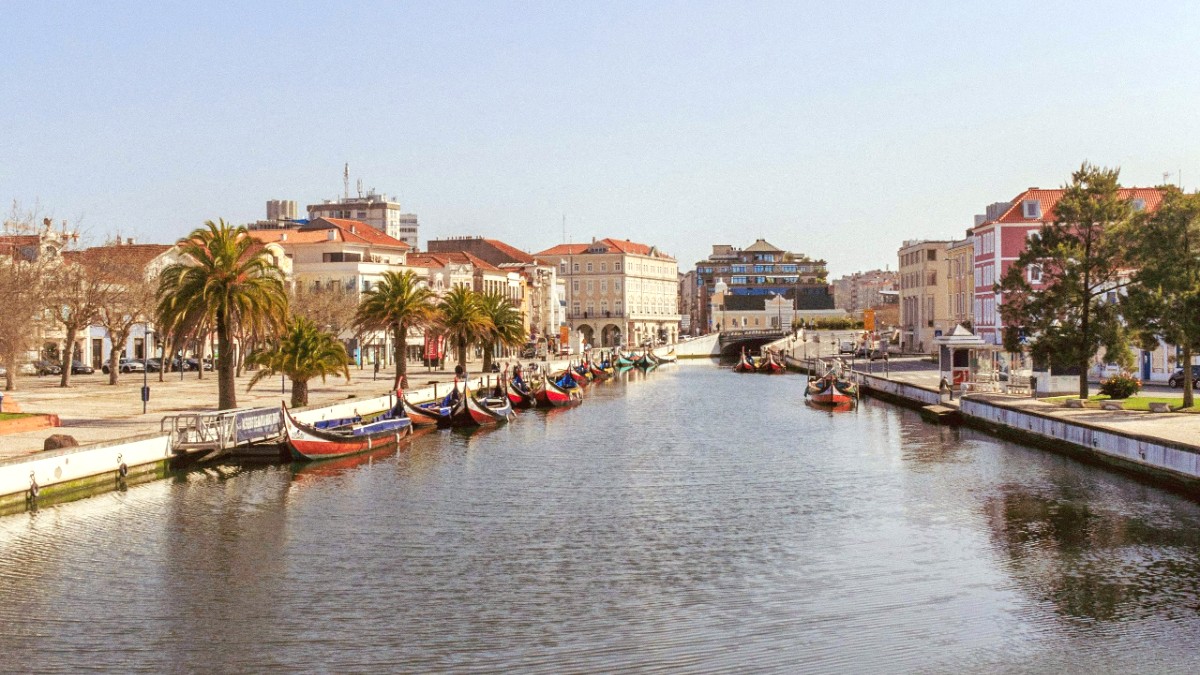
Portugal
Spring, from March to May, brings pleasant weather to Aveiro. Temperatures typically range from 10°C to 20°C (50°F to 68°F), delivering comfortable conditions for walking and sightseeing. While there is moderate rainfall, notably in March and April, the sun often shines, making it an enjoyable time to explore. Humidity levels stay comfortable. This season presents an ideal balance for those who prefer milder temperatures and a more relaxed pace. Summer, from June to August, is the hottest and driest period. Average temperatures hover between 18°C and 28°C (64°F to 82°F), though they can occasionally climb higher. Precipitation is low, for consistently sunny days. Humidity stays moderate. This is the peak season for tourism. Autumn, from September to November, sees a gradual cooling, with temperatures ranging from 12°C to 22°C (54°F to 72°F). Rainfall grows as the season progresses, with October and November being noticeably wetter. Humidity also rises. Early autumn, specifically September, often extends the pleasant conditions of summer. Winter, from December to February, is the mildest season. Temperatures average between 8°C and 15°C (46°F to 59°F). This period experiences the highest precipitation, and skies are often overcast. Humidity is high, and the air can feel damp.
Pack layers, especially during spring and autumn. Even on sunny days, evenings can become cooler. Always check weather forecasts closer to your travel date.
A Waterproof jacket or a Compact umbrella is a good inclusion in the shoulder seasons and throughout winter.
Portugal is a member of the Schengen Area, a group of 27 European countries that have abolished passport and all other types of border control at their mutual borders. Once you enter the Schengen Area, you can travel freely between member countries without further immigration checks. Citizens of the European Union (EU), European Economic Area (EEA), and Switzerland do not need a visa to enter Portugal. They can enter with a valid national ID card or passport, and they have the right to reside and work in Portugal.
Travelers from countries like the United States, Canada, Australia, and the United Kingdom do not need a visa for stays up to 90 days within any 180-day period. This visa-waiver applies to tourism and business purposes. A valid passport is the only required document for entry. Note that the 90-day period applies to the entire Schengen Area, not just Portugal. If you have visited other Schengen countries recently, count those days towards your 90-day limit.
A fully filled Schengen visa application form.
Valid for at least three months beyond your intended departure date from the Schengen Area and with at least two blank pages.
Two recent passport-sized photos meeting Schengen requirements.
Proof of travel insurance covering medical emergencies and repatriation with a minimum coverage of €30,000.
Proof of accommodation (hotel bookings, rental agreements) and a detailed flight itinerary (round-trip).
Upon arrival at your first Schengen port of entry (which could be Lisbon or Porto if flying directly into Portugal), you will go through immigration procedures. You present your passport to border control officers. They may ask about the purpose of your visit, your duration of stay, and proof of onward or return travel. While no general entry fees apply to tourists entering Portugal, some airlines or border control officials may request to see proof of sufficient funds for your trip, demonstrating that you can support yourself financially during your stay.
Special permits are generally not needed for typical tourism activities in Aveiro. Most attractions and activities are accessible without additional documentation beyond your passport and visa (if applicable).
Portugal does not have specific health-related entry requirements for common travelers. You do not need to present vaccination certificates or health declarations to enter the country.
Always carry physical copies and digital backups of your passport, visa, travel insurance, and booking confirmations. Keep these separate from each other in case one set is lost or stolen.
The currency used in Portugal, including Aveiro, is the Euro (€). ATMs are widely available throughout the city, making it convenient to withdraw cash. These machines, part of the Multibanco network, generally offer competitive exchange rates. Credit and debit cards, specifically Visa and MasterCard, are widely accepted in hotels, restaurants, and shops. It is a good practice to inform your bank of your travel plans before departure. This practice prevents your card from being blocked due to unusual international activity, supporting uninterrupted access to your funds.
Your daily costs in Aveiro, excluding flights, vary significantly based on your travel style. Here is an overview of expected spending for different traveler types:
Expect to spend approximately €40 to €70 per day. This budget typically covers a dorm bed in a hostel or a very basic guesthouse room, meals from local markets or "Prato do Dia" specials, and reliance on walking or public transport.
Budget between €80 and €150 per day. This amount accounts for comfortable stays in guesthouses or mid-range hotels, meals at traditional restaurants, some paid attractions, and occasional taxi or ride-share use.
Daily costs start from €180 and can go much higher. This budget covers stays in luxury hotels, fine dining experiences, private transfers, and more exclusive tours or activities.
Tipping culture in Portugal is not mandatory but is certainly appreciated for good service. There is no pressure to tip excessively, but a small token of appreciation acknowledges good service.
Opt for the "Prato do Dia" or "Menu do Dia" at local restaurants during lunchtime for a complete and delicious meal at a significantly lower price.
Aveiro's compact and flat city center makes it highly walkable, allowing you to explore many attractions on foot and save on transportation costs. Additionally, bicycle rentals present an excellent, inexpensive way to get around the city.